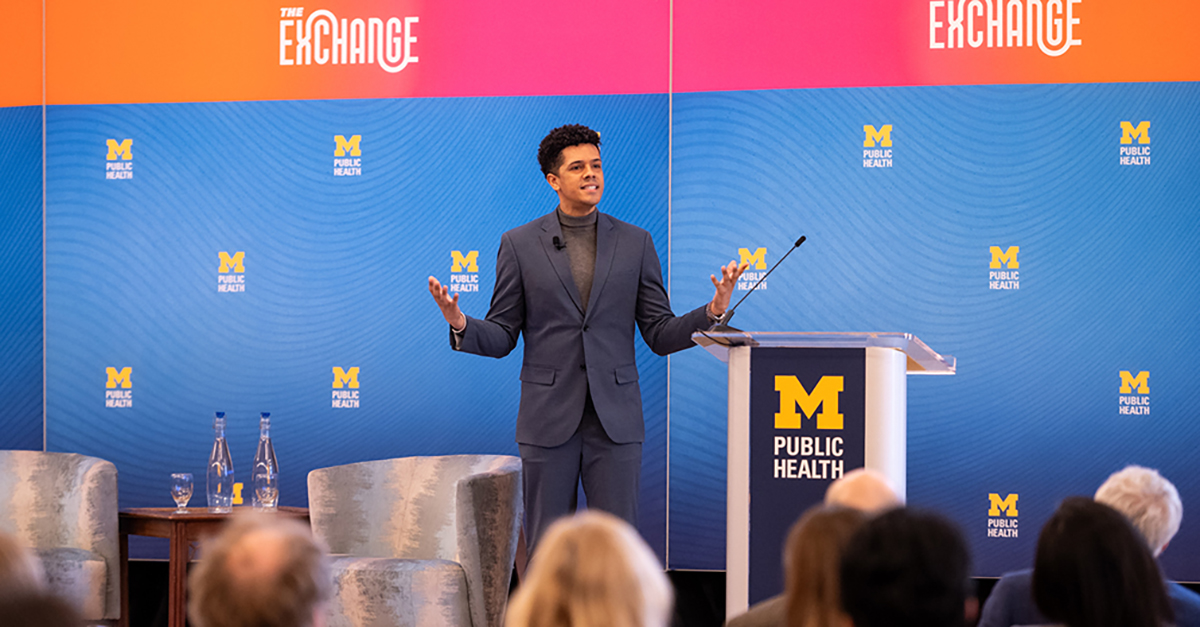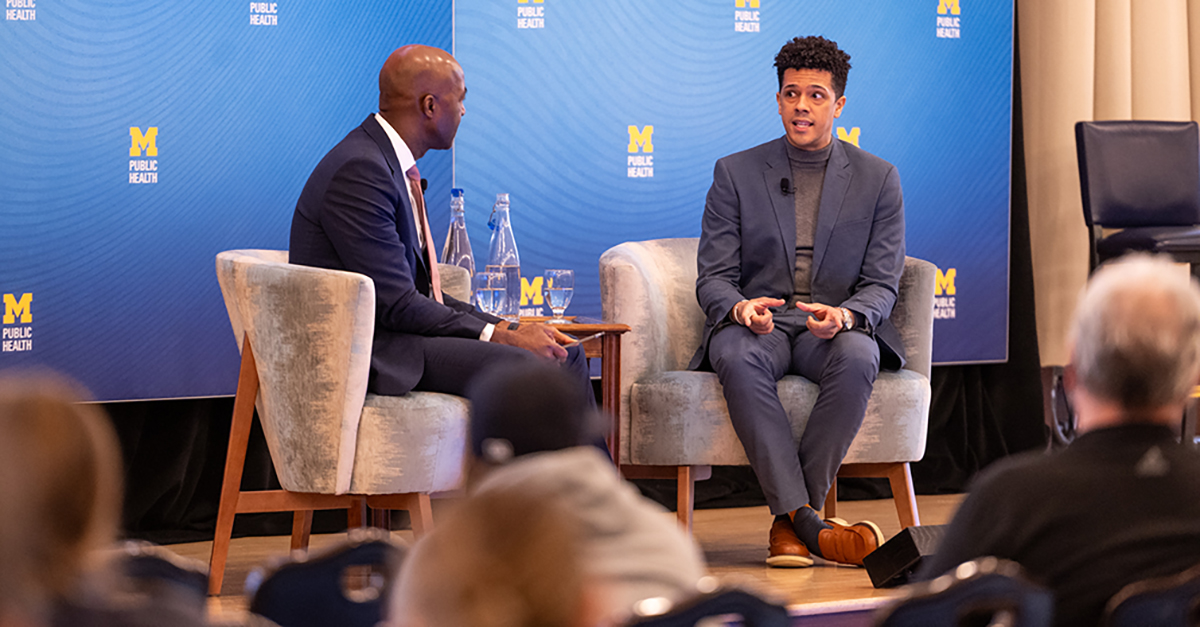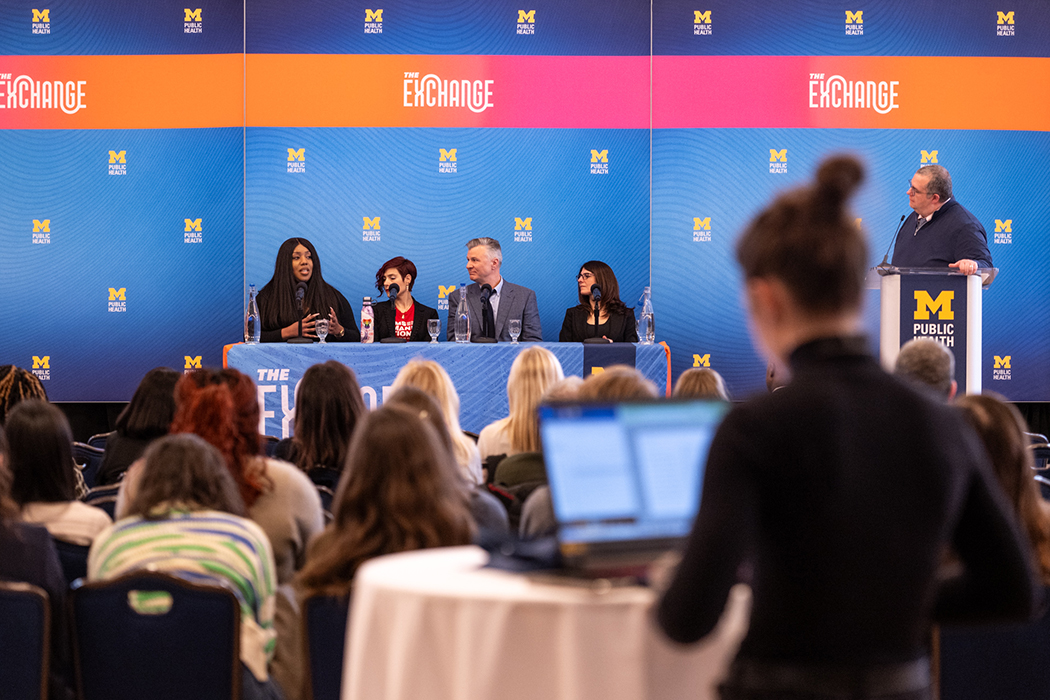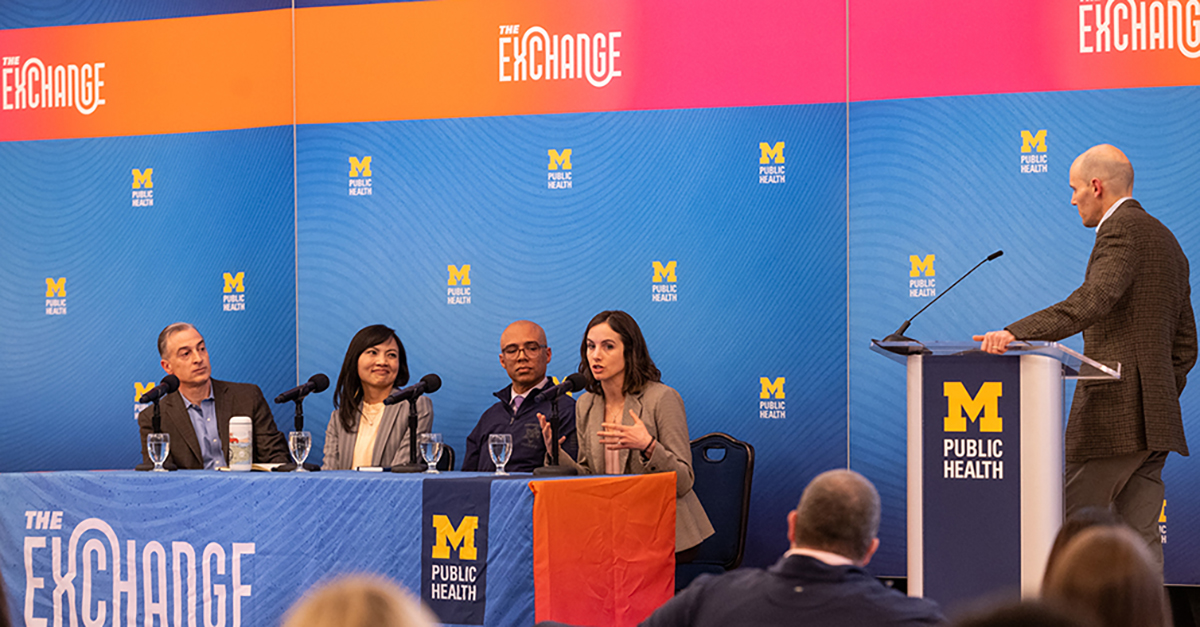Public health takes on gun violence crisis

‘The Exchange’ brings together experts to discuss solutions to national epidemic
ANN ARBOR—Preventing gun violence is a democracy project. That’s the message Brandon Wolf delivered during the “Public Health Approaches to Ending Gun Violence” seminar Feb. 13, 2024, in the Rogel Ballroom at the Michigan Union.
It was the second event of The Exchange: Critical Conversations with Michigan Public Health, an academic seminar series launched by the University of Michigan School of Public Health in fall 2023. This event was planned in collaboration with the Institute for Firearm Injury Prevention (IFIP) at the University of Michigan.
Wolf is a survivor of the 2016 shooting at the Pulse Nightclub in Orlando, Florida, and has become a leader in the movement to end gun violence in the United States, as well as a nationally recognized LGBTQ civil rights advocate. After narrowly escaping that night, during what was the deadliest mass shooting in the nation’s history at the time, he has channeled his life into fighting for a safer world for future generations and honoring victims of injustice with action.
Wolf shared his personal experience from that tragic night, when 49 people, including his two best friends, were killed and 53 more were injured. He highlighted the need for intersectional approaches to address these important issues and create a more inclusive society.
I promise to never stop fighting for a world that we can be proud of. A world where we send kids to school to learn math and reading and science, not which closet closes the tightest to save them from an active shooter. A world where we send grandma to the grocery store not being afraid that she’ll come face-to-face with the barrel of an AR-15 in the produce aisle. A world we can all be proud of if the world is finally free of gun violence, a world where we decide a better and safer future.”
—Brandon Wolf
“Preventing gun violence is a democracy project,” Wolf said. “It’s a project about changing the way our country works to keep people safer, and that’s why we have so much more work to do. The social work majors have work to do to care for communities to help address the root causes of violence. Folks in public health, we have work to do to keep delivering the research and data we need to help us target our solutions to saving lives. And, yes, even music majors, you have work to do too. It takes all of us to drive solutions—all of us. I have one common goal: to make our world better.”
Wolf is the National Press Secretary for the Human Rights Campaign. His memoir, “A Place for Us,” was released in July 2023 and became a bestseller. He recently served as press secretary for Equality Florida, the state’s LGBTQ civil rights organization.
Wolf urged public involvement in the democratic process by knowing and holding accountable lawmakers at all levels of government—and also said that playing the “long game” is necessary. In the short term, he suggested that advocacy starts in one’s own circles: He advised attendees to act as a “trusted messenger” with friends and family to change hearts and minds.
Wolf expressed confidence that a safer, gun-violence-free world is possible thanks to the work of dedicated individuals and communities.
“I promise to never stop fighting for a world that we can be proud of,” he said. “A world where we send kids to school to learn math and reading and science, not which closet closes the tightest to save them from an active shooter. A world where we send grandma to the grocery store not being afraid that she’ll come face-to-face with the barrel of an AR-15 in the produce aisle. A world we can all be proud of if the world is finally free of gun violence, a world where we decide a better and safer future.
“I believe that a world that we all can be proud of is not just possible; it’s inevitable. It’s inevitable because of the people in this room and the work you are doing—this is where the work happens. I think that the possibilities of the future are endless.”
Evidence-based, public health solutions
More than 326 people are killed or injured by a firearm every day, with 39,000 premature deaths annually across the United States, according to the Institute for Firearm Injury Prevention. Firearm injuries are now the leading cause of death for children and teens. At the state level, 1,382 people on average die by firearms each year in Michigan, and 56% of gun deaths, or about 780, are in the state are suicides according to Everytown for Gun Safety and the American Foundation for Suicide Prevention, respectively.
Public Health IDEAS for Preventing Firearm Injuries, IFIP and scholars at the University of Michigan are leading efforts to prevent gun violence.

“I think all of us here today understand how critically important the issue of gun violence is in the United States,” said F. DuBois Bowman said, dean of Michigan Public Health. “It’s an issue that has unfortunately touched many of us. We’ve felt the impacts within our own communities here in Michigan in the aftermath of the Oxford High School shooting and the Michigan State University shooting, which happened one year ago today.
“Firearms are the leading cause of death among children and teens, both in Michigan and nationwide. While the issue of gun violence may seem insurmountable at times, we’re here today because gun violence is preventable. Gun violence is a public health issue, and there are evidence-based, public health solutions that we know can prevent injury and death.
“I'm proud that we have a group of faculty, staff, students and postdocs at the University of Michigan who are actively working in this space and who are desperately seeking to make changes.”
The event coincided with new pieces of gun safety legislation being introduced in Michigan that aim to address safe storage, background checks, red flag laws and gun bans for domestic violence offenders.
Firearms are the leading cause of death among children and teens, both in Michigan and nationwide. While the issue of gun violence may seem insurmountable at times, we’re here today because gun violence is preventable. Gun violence is a public health issue, and there are evidence-based, public health solutions that we know can prevent injury and death.”
—Dean F. DuBois Bowman
Rebecca Cunningham, vice president for research and innovation at the University of Michigan, concurred with Bowman. She is the former director of the University of Michigan Injury Prevention Center, and established a national consortium to improve firearms safety.
Reflecting on her experience as an emergency medicine physician, Cunningham emphasized the critical challenge firearm violence poses and the need for comprehensive, interdisciplinary solutions that encompass health, social sciences, engineering, policy and the arts.
“As someone who’s worked in this area for more than two decades, I know at times this topic can feel deeply painful,” she said. “But I also see so much hope in the progress and the work that you all have created and the momentum that we have so far that will create a path forward.”
After Wolf’s keynote speech and a Q&A with Bowman, two expert panels offered additional expertise to the discussion from a variety of viewpoints.
Policy solutions to gun violence
The first panel, “The Legislation Tightrope: Policy Solutions to Gun Violence,” featured April Zeoli, associate professor of Health Management and Policy at Michigan Public Health and the director of Policy Core at IFIP; Douglas Wiebe, professor of Epidemiology and co-director of Data and Methods Core at IFIP; Adaora Ezike, fund development officer for the City of Detroit; and Celeste Kanpurwala, Michigan chapter leader for Moms Demand Action for Gun Sense in America. The panel was moderated by Patrick Carter, associate professor of Health Behavior Health Education at Michigan Public Health, associate professor of Emergency Medicine at the University of Michigan Medical School and co-director of IFIP.

Zeoli’s extensive research and expertise on policy were instrumental in getting key pieces of gun legislation signed into Michigan law last year. The Extreme risk protection order (ERPO), or red flag law, is one of the new laws that mandates a person purchasing a handgun or a long gun, whether from a licensed dealer or a private seller, needs to undergo a background check to obtain a license for the purchase.
This new regulation aims to prevent individuals who shouldn’t have access to firearms for reasons such as a history of violence, certain mental health conditions or criminal backgrounds from easily acquiring them. By ensuring background checks for all firearm purchases, policymakers and advocates hope to close loopholes that have previously allowed individuals to bypass background checks, thus enhancing public safety and reducing firearm-related injuries and deaths.
Zeoli pointed out the next step is federal legislation.
“Today, if someone is under extreme protection here in Michigan, or otherwise prevented from purchasing a gun here, they can drive a half hour to Ohio and buy from private sellers without a background check because we don’t have a federal policy,” she said. “If we had that federal policy, we would be better able to prevent people who we decided as a society are too dangerous, at this moment, to have a gun.”
Wiebe, who studies interactions between people and the environment and health risks that result with a focus on injuries and violence, cited a reason for optimism by drawing a parallel to auto safety.
“One of the greatest public health success stories of the 20th century was the dramatic reduction in deaths in motor vehicle crashes that occurred over the last century,” he said. “And I know that didn’t just happen; it was very deliberate. There was certainly no one-size-fits-all solution, as will be the case for firearm injury prevention.”
Today, if someone is under extreme protection here in Michigan, or otherwise prevented from purchasing a gun here, they can drive a half hour to Ohio and buy from private sellers without a background check because we don’t have a federal policy. If we had that federal policy, we would be better able to prevent people who we decided as a society are too dangerous, at this moment, to have a gun.”
—April Zeoli
Public health was charged with coming up with safety standards for more vehicles, he said, as well as for roadways and the whole transportation infrastructure. Public health practitioners were challenged to be more scientific and strategic about injury prevention.
Weibe said the same approach needs to be undertaken for firearm injury prevention, involving primary, secondary, and tertiary prevention methods, addressing individuals, objects, environments, and social factors to mitigate injury and promote survival.
Community engagement solutions to gun violence
The second panel, “Build the Big Tent: Community Engagement Solutions to Gun Violence,” showcased Charles Branas, chair of the Department of Epidemiology at Columbia University; Derrick Jackson, director of Community Engagement in the Washtenaw County Sheriff’s Office; Hsing-Fang Hsieh, MPH '06, PhD '12, research assistant professor at IFIP and evaluation director for the National Center for School Safety at the University of Michigan; and Rebeccah Sokol, assistant professor in the School of Social Work and co-director of Training and Education Core at IFIP. It was moderated by Justin Heinze, associate professor of Health Behavior and Health Education at Michigan Public Health, and director of the School Safety Section and co-director of Research and Scholarship Core for IFIP.

Heinze said that Michigan Public Health is galvanizing efforts to address firearm violence, identified as a critical issue by faculty through Public Health IDEAS. This initiative, led by Heinze, recently marked its second anniversary since launching, seeks to move the needle in four strategic areas, particularly in research.
“This necessitates interdisciplinary collaboration across various departments and extends beyond academic research to include community engagement and educational program development” he said. “The goal is to translate findings into actionable solutions for affected communities and to train the next generation of public health professionals, ensuring that gun violence prevention is integrated into their broader work.”
Throughout the panel, the experts explored gun violence and social inequities and relationship building with a public health lens, emphasizing the need for education, research, workforce development, community engagement and multifaceted approaches.
Engaging with the community requires a sustained effort that may be unfamiliar to many researchers, Hsieh said, but that shouldn’t be a deterrent. She encouraged researchers to consider how they can maintain an ongoing dialogue because it is crucial not to neglect this crisis.
I don't think community engagement is a program; it’s not a feel-good thing you do once or twice. Community engagement is a way you think about the world.”
—Derrick Jackson
“Community members often contribute insightful perspectives, and with the resources available, we must collaborate to achieve our goals and guarantee enduring success, which is indeed the challenging part,” Hsieh said.
A recurring theme was the need to have as many diverse voices at the table as possible, and particularly those who have been impacted by gun violence. Jackson emphasized the need for community engagement to be baked into everything.
“I don't think community engagement is a program; it’s not a feel-good thing you do once or twice,” he said. "Community engagement is a way you think about the world.”
Branas said he’s encouraged by events like The Exchange because the term “firearm” used to be a nonstarter in health research.
“This seminar is a positive move toward including diverse perspectives in conversations about sensitive issues,” he said. “Sometimes, we talk so much about the problem that it can generate a sense of hopelessness. My hope is that we turn that around and not simply talk about the problem but rather what solutions can be created in communities that can generate long-term excitement about the possibility of a different future.”
So, now what? Advice on making your voice heard
Wolf said the power of personal influence cannot be overstated in the battle against gun violence. Each individual has the potential to be a catalyst for change, starting within their own networks and relationships, citing his family as an example. While someone like his father—a gun owner—might not watch a particular television station or read a certain article that includes differing viewpoints than his own, he will take his son’s phone call.
“We can have conversations that he would not have with absolutely anybody else,” Wolf said. “They don't come with judgment. Just a dad and a son talking about the world.”
He also called on those in the audience to become trusted messengers within their own networks as one way to harness their passion for solving this problem. Through these personal connections and conversations, as trusted messengers in our community, individuals can create ripples of impact through their conversations, shifting public opinion and bringing about lasting change.
“Gun safety measures across the country are very popular, and they’re mobilizing people to the polls. Candidates who say they want to do something about gun safety are winning over and over again. The absolute most important thing is to run for office if elected officials refuse to serve. It’s time to run and defeat them. It’s time to put somebody else in that seat who wants a better, safer, more inclusive future.”
—Brandon Wolf
Wolf also advised attendees to engage with their lawmakers to effect policy change on gun violence, stressing patience because change doesn’t happen overnight.
Understanding the personal motivations of lawmakers is key, knowing that personal stories—such as his—can impact their views, he said. With changing public opinion, gun safety is playing a significant role in elections, with candidates around the country winning on gun reform platforms in recent elections.
If lawmakers are unresponsive due to entrenched interests, particularly from the gun lobby, Wolf emphasized the importance of running for office to replace them.
“Gun safety measures across the country are very popular, and they’re mobilizing people to the polls,” he said. “Candidates who say they want to do something about gun safety are winning over and over again. The absolute most important thing is to run for office if elected officials refuse to serve. It’s time to run and defeat them. It’s time to put somebody else in that seat who wants a better, safer, more inclusive future.”
